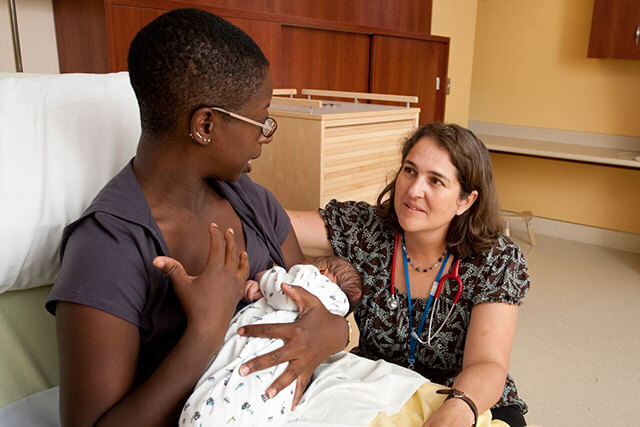There has been an increased demand for midwifery in Canada over the past decade, with now over 1,300 midwives registered in Canada, while in 2005, there were just 500.
Alix Bacon, elected president of the Midwives Association of British Columbia (MABC), attributes this growth to the personalized care midwives offer to mothers and their families, as they provide continuous support during pregnancy, labour, birth, and up to six weeks afterwards.
While midwifery’s continuity of care principle can be valuable for all mothers in Canada, Manavi Handa, a midwife and activist focusing on serving immigrant mothers, believes that this model can have particular benefits for women new to the country and its medical system.
For instance, Ali Moreno, an Ecuadorian woman who had her baby in Vancouver, is particularly happy she chose midwives as her health care providers.
“They take the time to get to know you, understand your background.”
“With doctors, the clock is always ticking,” Moreno explains. “Appointments with midwives last up to 45 minutes. They take the time to get to know you, understand your background, and take care of your emotional and physical wellbeing.”
However, Handa explains, newcomers may not necessarily consider this option when first looking for maternal care in Canada.
“People come here expecting modern healthcare and they don’t always associate midwifery with that because they don’t know how well trained we are or what we do,” she says.
What is a midwife?
Midwives are specialists in low-risk maternal and newborn healthcare.
The midwifery practice in Canada differs from practice abroad in several aspects, such as the number of births attended annually and the level of contact with mothers throughout their pregnancy.
In Canada, midwifery is managed by each individual province and territory and is currently regulated in nine. Services are publicly funded in all regulated locations.
Midwifery in Canada requires all practitioners to have a bachelor’s degree. Handa, who teaches at Ryerson University, explains that the seven midwifery programs in Canada have theoretical and practical components, including two years attending to mothers under the supervision of experienced midwives.
“We empower women to make the decisions that are appropriate for them.”
People trained abroad can practise midwifery in Canada by completing shorter bridging programs, making it an attractive option for new immigrants.
According to information provided by the Canadian Association of Midwives (CAM), midwives in Canada are registered primary healthcare professionals that are fully trained and have access to all the necessary equipment, diagnosis services, and select medications to provide women and their babies the care they need from pregnancy to postpartum.
However, midwifery understands pregnancy and birth as healthy and normal aspects of life, and as such, aims for the least amount of interventions possible.
“Technology is great if you need it, but medical intervention when you don’t need it can lead to other risks,” Handa explains.
This consideration, together with the continuous support they provide, results in lower rates of medical interventions and shorter hospital stays for women who engage the services of a midwife, according to data from the Association of Ontario Midwives (AOM).
 Cultural sensitivity
Cultural sensitivity
Midwifery is guided by the informed choice principle, which encourages women to be active decision makers in the care they receive. Handa explains that this principle respects individuality.
“This is of particular importance to immigrants because they may have their own cultural beliefs. We empower women to make the decisions that are appropriate for them.”
She adds that because women primarily practise midwifery, newcomers from countries where only women attend labour might feel more comfortable under their care.
For Moreno, this was an important component during her pregnancy in Canada.
“The fact that midwives are women makes you feel safe and understood. They know how you’re feeling because they probably went through something similar themselves,” she says.
Organizations also try to eliminate possibly language barriers for new Canadian mothers to be. Ontario Midwives includes information in different languages, and MABC offers help finding midwives that speak languages other than English inside the province.
The benefits
Another principle of midwifery that increases the number of options for mothers is choice of birthplace. According to CAM, “people might have the misconception that midwives only attend homebirths, but they can actually choose to have their babies at hospitals or birth centres too.”
In Ontario, these cost savings are increased because women can access midwives’ care for free, regardless of their immigration status.
Engaging a midwife can also be cost effective. A study of birth costs in B.C., published on July 2015, reports more than $2,300 savings per birth in the first postpartum month among women who planned a homebirth with a midwife compared to a hospital birth with a physician.
In Ontario, these cost savings are increased because women can access midwives’ care for free, regardless of their immigration status.
For women in provinces such as B.C. where uninsured individuals cannot have the services for free, Bacon explains that it would still be more affordable for them to seek care through a midwife than a physician and to have a homebirth instead of staying in hospital.
What if complications arise?
In specific cases of high-risk pregnancies, each province has guidelines for midwives to consult with or refer women to other health specialists.
Midwives can also provide shared care or transfer the care at any point, if needed.
“If a more serious complication arises, the most responsible care provider would become an obstetrician, but we would remain in a supportive role,” explains Bacon.
This was what happened in Ali’s case.
She initially planned to have a homebirth, but she had complications during labour.
“I decided to go to the hospital. Midwives, nurses, and doctors were all great,” she remembers. “They worked together and they helped me choose the safest option.”
Journalist Leah Bjornson, through the New Canadian Media mentorship program, mentored the writer of this article.
Belen Febres is a Phd Candidate at Simon Fraser University with a focus on Community Media and Health Communication. Belen collaborates with historically silenced communities and communication initiatives to co-create spaces for self-representation and social change.





